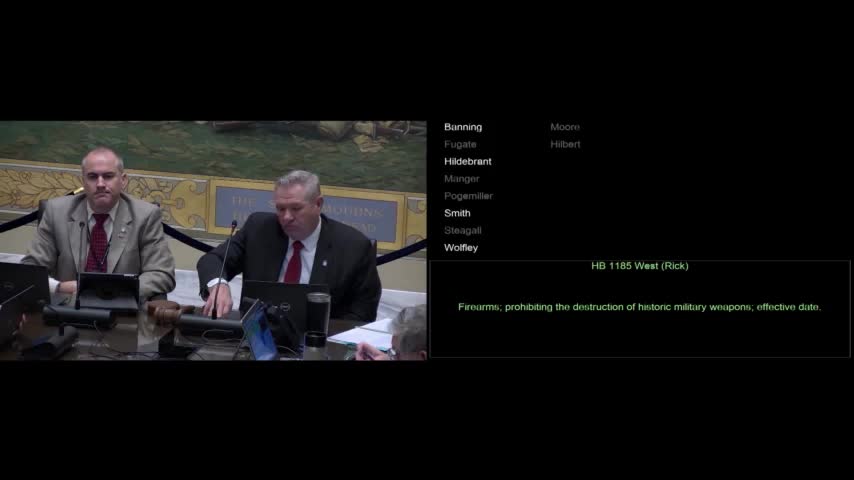Committee backs bill to donate confiscated historic military weapons to veterans’ groups
Get AI-powered insights, summaries, and transcripts
Subscribe
Summary
The House Veterans and Military Affairs Committee voted 8-0 to report a bill that would prohibit the destruction of law‑enforcement‑confiscated weapons found to have historic military value and require donation to local veterans’ units for ceremonial and museum use.
The House Veterans and Military Affairs Committee voted 8-0 to report a bill that would prevent law‑enforcement agencies from destroying confiscated weapons if an agency determines the item has historic military value and instead requires donation to local veterans’ organizations for ceremonial use and museums, Representative West said during the committee’s meeting.
Committee members said the bill aims to preserve weapons used by honor guards and provide parts to repair nonworking ceremonial rifles, reducing unnecessary destruction and preserving historical links for future generations. "Organizations like the Disabled American Veterans, Veterans of Foreign Wars and the American Legion have honor guards to salute veterans at their funerals," Representative West said, reading a paragraph submitted by the vice commander of Disabled American Veterans Chapter 63 in Poteau.
Under the bill as explained to the committee, if an agency determines that confiscated personal property is a weapon with historic military value, the agency would be prohibited from destroying the weapon and would donate it to a local unit of veterans. Representative West told the committee the weapons often are not functioning and are kept for parts to maintain ceremonial rifles: "They don't have to shoot. They need parts to rebuild the guns that they have," he said.
Members asked several procedural and legal questions. Representative Fugate confirmed the bill would not change existing due‑process procedures for owners whose weapons were confiscated; those owners would still have any existing reclamation rights. Representative Pogue Miller asked who would make the historic‑value determination; Representative West said law‑enforcement agencies — typically the sheriff's office that originally took possession — would work with veterans' groups and decide whether a weapon qualifies. Representative Manger asked whether transfers would require federal paperwork for regulated weapons; a committee speaker replied that veterans organizations typically either hold their own Federal Firearms License or will transfer weapons through a member with such a license so the pieces are recorded.
Representative West moved for a do‑pass recommendation and the committee seconded the motion. The committee opened the vote and the clerk announced eight yeas and zero nays; the bill was reported as a do pass out of committee.
The bill now moves forward with the committee's recommendation; the transcript does not specify the next committee or floor calendar date.
